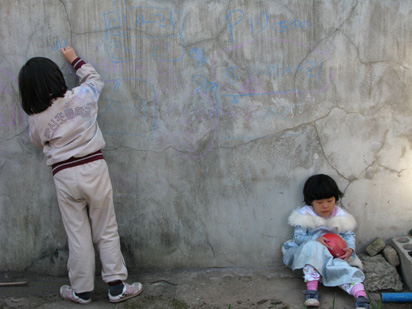ARCHIVE
So Yong Kim's Treeless Mountain: The Stop Smiling Film Review
The Stop Smiling Film Review

(Oscilloscope)
Thursday, May 07, 2009
Treeless Mountain
Directed by So Yong Kim
(Oscilloscope)
Reviewed by Sarah Silver
So much of Treeless Mountain consists of close ups or tightly framed two-shots that its young stars’ faces become vast landscapes stretching the width of the screen. We are given such ample opportunity to explore every inch of the doll-like physiognomy of sisters Jin (six-year-old Hee-yeon Kim) and Bin (five-year-old Song-hee Kim), that the little mole on Jin’s left nostril becomes an anchor helping us stay centered, and the appearance of a Y-shaped scar on baby sister Bin’s upper right cheek feels like a major plot point.
Treeless Mountain, in its crisp simplicity, resembles a good poem, with many layers lurking beneath the organized, metered surface. The story revolves around the two young sisters and, peripherally, the three women who act as their caregivers at different moments during this critical time in their lives. The already mature Jin and the more coddled Bin are forced to grow up quickly when their mother takes them to stay with “Big Aunt” while she goes to take care of unfinished business with their deadbeat dad.
Before leaving, their mother promises the girls that once their piggy bank is full of coins, she will return. Thus their red plastic piggy takes on a mystical significance in their lives, since it holds the power to bring their mother back to them. This magical storyline, reminiscent of the Frankenstein legend that haunts another porcelain doll of the cinema, Ana Torrent, in 1973’s The Spirit of the Beehive, is all the more heartbreaking since we know we are not watching a children’s fantasy film, but rather that the hopes and dreams driving the girls through this difficult time are based on a lie a grown-up told them.
The girls dress according to their defining characteristics: sensible Jin wears a school uniform in Seoul and a practical grey tracksuit in the country, while Bin wears an omnipresent blue princess robe with a tatty fur collar that frames her face like a grande dame of old cinema. Dialogue is limited, and Jin and Bin convey a seemingly limitless range of emotion all with facial expressions. Jin’s determined little face, peering out from under Lulu-esque bangs, visibly registers every blow, no matter how minute, while Bin’s expression of placid resignation echoes that of an old woman who has moved beyond the desire to fight.
Largely ignored by Big Aunt, who often forgets to feed them, the girls wander listlessly around their neighborhood day in and day out, occasionally meeting people (like the friendly neighbor woman who, thankfully, invites them in for cakes), but most often on their own, quietly and meditatively taking it all in. They are enterprising, even entrepreneurial, and when Jin sees there is a demand for fried grasshoppers amongst schoolchildren as an after school snack, she and Bin start up a profitable little business. Their coin collection quickly grows in a basic survival metaphor that recalls the wayward boy lost on Coney Island in Little Fugitive, driven to collecting bottles on the beach and recycling them for pocket money. When Bin worries that the insects may be suffering, Jin’s reply of “Why would it hurt? They are dead already” manages to sound both Zen and chillingly pragmatic, cluing us in to her rapidly hardening worldview.
Amidst such sparse dialogue, a few words stand out, such as Bin’s repeated cries of, alternately, “Mom!” “Sis!” and “Lady!” This triumvirate, like a female version of Father, Son, and Holy Ghost, calls our attention to the fact that, apart from a few neighborhood boys and the off-screen voice of Grandpa, there are only women in the film. Thus the film moves beyond a Forbidden Games-style juxtaposition of innocence influenced by an undercurrent of solitude, abandonment, and death, to incorporate themes of generational misunderstandings between women. It is only when they finally meet their grandmother, who grows her own food on her own farm, that the girls find a kindred soul whose stoicism and resourcefulness matches their own.


